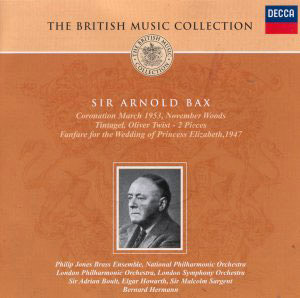This is a journey in sound. From the not merely friable but
actully spalling 1955 sound of the Boult Tintagel to the
digital Philips riches of Marriner's November Woods.
The playing time is short dictated by the slender store
of Bax in the Decca-Philips-DG archive.
The Boult Tintagel sounds about as bad
as the similar vintage English Dances on the Arnold disc also
from the British Music Collection. As a performance it has great virtues
far outstripping the cruise-control of his 1972 Lyrita recording. It
remains eclipsed by the work's first ever recording the one conducted
by Eugene Goossens (78s from the 1920s). Boult is as aggressive as Solti
in Elgar and demonstrates irritability and the gusty tetchiness of a
floodtide. This is the same Boult we hear in the unmissable Omega CDs
of the Sibelius tone poems. Such a pity about the sound quality. The
Coronation March sounds so much better than the Boult
Tintagel with its clarion trumpets, ripe celesta, bell sound
and tingling clarity. As music it is a pale shade of the Bax of the
1920s and 1930s. Sargent however gives it a walloping run for its money,
with bags of brag and pomp and is especially good at the Tchaikovskian
string cascades of the finale.
While the Boult Tintagel is a superior interpretative
article though in fallible audio the Marriner November Woods
is a fallible performance in supremely engineered sound. Marriner lets
the music spread and meander with fatal indulgence. Boult's Woods
on a Lyrita CD (you can still get them from Harold Moores at Great Marlborough
Street, London) is the version to go for. Though I am critical of Marriner's
approach I confess that after hearing the poem several times I think
Marriner handles the gradual descent of the last pages into satiated
exhaustion very well indeed.
After the inconsequential fanfare (Bliss was so much
better at this sort of thing!) Herrmann gives a vivid performance of
the two Oliver Twist episodes. The sound is matchless. It is
after all the best of 1970s Decca Phase Four techicolour with wide-stage
antiphonal effects. Herrmann makes a much better job of this than of
Bliss's Things to Come (from the same LP) which I last heard
in the Bliss double in this Decca series. He builds a groaning depth
of string sonority for the satiated sunset music of the finale. The
upcoming Chandos (BBCPO/Rumon Gamba) recording of the complete film
music will have to be exceptional to match this.
This is not an absolutely recommendable Bax collection.
Bax collectors will want it because it fills a number of longstanding
gaps. Others would be better advised to try before you buy.
Rob Barnett


